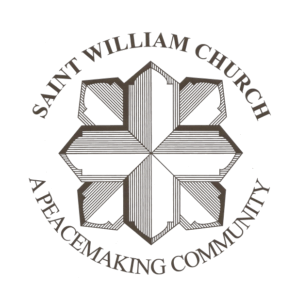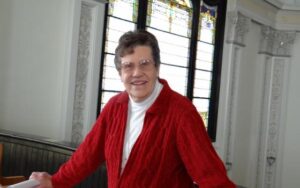
Share
My grandmother taught me about Jesus. She taught me what Jesus’ hands looked like — strong and weathered from service. She taught me the ways his heart bent toward the least, the forgotten, the undervalued, the sick and the frail. She taught me what made Jesus weep. My grandmother taught me that Jesus did not sympathize. Jesus empathized. God was incarnate, and we have our own vocation to be part of that incarnation. She taught me to get comfortable in that tension between the world and the Church. She taught me that Jesus sat with people in the darkest moments of their lives, because that is where his Father was.
I’m a convert to the Catholic Church. I was raised in the United Church of Canada. Going to Church wasn’t optional on Sunday, but simultaneously, it wasn’t talked about in polite company on weekdays. Services had a gentle flow with an apologetic timbre. The thanksgiving was polite; the praise, subdued. The best part of the worship for me was leafing through the hymnal and teaching myself to sing all four parts on the staff. Communion was rare. It was the most delectable hand-cut square of Wonder Bread and the most delicious thimble of grape juice you’ve ever tasted. The reverence with which my father demonstrated the profundity of that moment was a witness I will never forget. He may not have spoken about his faith, but in those moments he embodied it.
The real work of evangelization happened in the kitchen. The church ladies. Those ladies were Marthas, working tirelessly to feed, clean, teach and tend. They were the magnetic force around which the whole operation orbited. They built the community with their rotary-dial telephones, and hours and hours of listening. It was ministry. They provided meal trains to new moms or people with sick spouses long before SignUpGenius streamlined the whole affair. They were shepherds. They were holy women. I looked at those old ladies and I heard God’s voice in the depths of me saying serve like this. Those women were deacons. Not designated or ordained, but undeniably deacons.
I studied Music and Religious Studies at McGill University and during this time I found a spiritual home in the Catholic Church. Like most converts, I would give the personal nature of the sacraments credit for having moved my heart toward the fullness of the faith. Christ wasn’t distant after his resurrection; he was still with us and working through us. By the power of the Eucharist we were given the agency to be Christ’s hands and feet in the world. Even in my conversion I was discerning God’s clear call over my life to a ministry of service, despite what can feel like limited opportunities for women in the Catholic Church.
I am currently Director of Pastoral Care and Liturgy for two large parishes in Wellesley, Massachusetts. The ministry includes baptismal preparation, liturgical planning, scripture and small group faith studies, prayer and communion services, social justice work and grief ministry. I visit the homebound, council the doubtful and pray with the dying. I am living a ministry that was always the call over my life — in large part because I work with a pastor who recognizes the unique gifting of women.
I continue to discern how to navigate the sometimes painful tension of living an unrecognized vocation as Deacon while also desiring to be faithful to the Church I love and commit to serve. In the meantime, God continues to reveal how God wants me to show up and serve his people. I hope the Church can come to recognize this service without fear. I pray there may soon be a time when women are restored to the diaconate and assisted by sacramental grace as they live their vocation.
Kelly Meraw is the director of collaborative pastoral care and the director of music and liturgy at St. John the Evangelist Parish in Wellesley, Mass.
Receive Our Newsletter
This is the hub where we share relevant news, events and opportunities to participate in the work.
*We will send the newsletter only once each week, and we will never share or sell your information.


